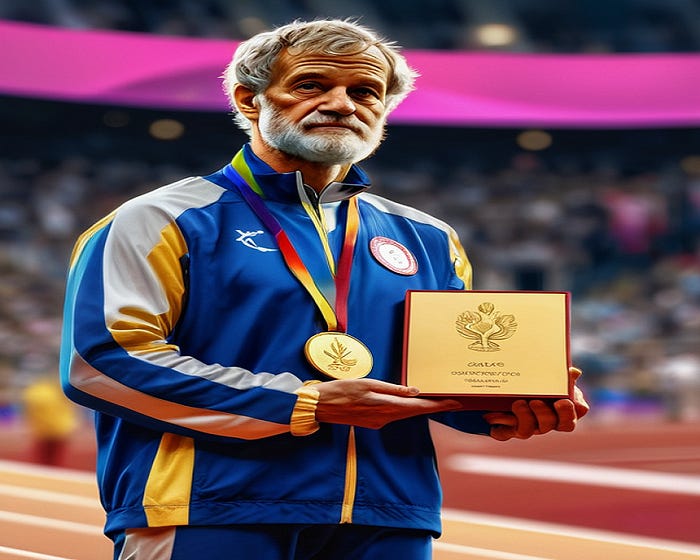Excellence Is Something You Do, Not Something You’re Born With
Aristotle’s timeless advice no one wants to hear about being the best you can be in all things
Talent often gets confused with magic. And it’s only logical this happens, because those with great skill can be the ultimate illusionists. You might say they perform a trick without showing you how it’s done.
When I first joined martial arts, our instructor did this regularly. While he was physically gifted, the thing that amazed us was his unique ability to teach memorable exercises in class. His planning was just staggering.
He’d come into class with no notes or guide (very informal), then teach us one movement. This technique would magically solve three or four problems, which appeared to have no connections in the beginning. It was mind blowing to us.
He did it so regularly, one day a friend of mine in class asked how he miraculously planned it out this way. His answer was only more confusing. He gruffly said, “I just do,” and that was it.
No secret blackbelt handbook.
No star charts.
No spirit of Chuck Norris possessing his body and giving him special knowledge.
We didn’t quite understand his point at the time, and just attributed it to a special talent he was born with we couldn’t see. His reply would only make sense years later when we started to teach ourselves. Like the classes, his words also solved many mysteries.
For instance, how Olympic athletes win gold medals, how famous musicians are so talented, and how great authors create the works you devour. It also opens a path to living the best life you want to live.
So, what’s the secret answer? Here’s where I break your heart — there is no magic or “secret.” The answer is so boring and mundane, most don’t want to hear it. Excellence is something you do, not something you’re born with.
Aristotle based his philosophy on this thousands of years ago. While record- breaking Olympic swimmers proved it in the pool during a famous scientific field study in the 1980s. But more recently, a professional poker player named Cate Hall gave it her own twist in another body of water.
Crossing The Moat Of Low Status
In her article How To Be More Agentic, Hall reveals she’s done a lot of cool things in her life that appear magical for one human being to accomplish. She goes through the following list of achievements:
“I was a Supreme Court advocate and the number one female poker player in the world; started art and perfume companies; and led operations at Alvea, a pandemic medicine company I co-founded, when it set the record for the fastest startup to take a drug to clinical trials. All of these things I did in my 30s.”
Oddly, she notes she’s not smarter, or born with any kind of talent others lack. In fact, Hall says she feels dumber as she ages because she’s surrounded by people who become increasingly smarter than her. She levels the playing field by “radical agency.”
In other words, Hall finds and does things no one else wants to do, or ignores. She also isn’t afraid to cross “the moat of low status.” This is a place where you’re really bad at something or look foolish. It’s a moat, because you can’t jump across it, you must splash through it, learning lessons.
Hall says, “If you can learn to thrive in the moat, it’s incredibly liberating.” It’ll also take you closer to excellence, but Aristotle had his own word for it. He called it “arete.”
Aristotle And Making Excellence A Habit
Professor of philosophy Dr. Susan Sauvé Meyer explains Aristotle’s book Nichomachean Ethics is a guide to living a good life by practicing virtue and pursuing worthy goals.
In an interview with Ryan Holiday, Dr. Meyer says the ancient Greeks often connected these goals and virtues with the term arete. While its base means “goodness,” the word often associates with excellence in serving a purpose. Now, this applies easily to things.
For instance, an excellent knife cuts well, while an excellent ship sails well, but applying this to a person…gets complicated. Being the richest or most successful isn’t necessary for arete. In his book, Aristotle reminds us we don’t have to “rule the earth and sea” to act with virtue or be noble.
Being the best person you can be qualifies, but there is one solid requirement you can’t get around. You have to act regularly. The training generates excellence, otherwise it doesn’t exist. Historian Will Durant sums up Aristotle’s idea beautifully in The Story of Philosophy:
“Excellence is an art won by training and habituation. We do not act rightly because we have virtue or excellence, but we rather have these because we have acted rightly…We are what we repeatedly do; excellence then is not an act, but a habit.”
So, no magic or secret, boring habitual training creates arete. There’s scientific backing for this as well.
Olympic Swimmers Are Exceptional By Mundane Methods

“Excellence is mundane. Superlative performance is really a confluence of dozens of small skills or activities…which have been carefully drilled into habit and then are fitted together in a synthesized whole. There is nothing extraordinary or superhuman in any one of those actions; only the fact that they are done consistently and correctly, and all together, produce excellence.”
— The Mundanity of Excellence: An Ethnographic Report On Stratification And Olympic Swimmers, Daniel Chambliss
In the early 1980s, professor of sociology Daniel Chambliss wanted to figure out how to achieve excellence in any pursuit. He decided to study competitive swim teams. Unlike painters, musicians, waitresses, or parents, Chambliss points out excellence in swimming is easy to quantify.
The quickest time equals the best in the pool. Moreover, well-structured competitions and leagues set the standings.
Careers are short, and extreme success can occur in a small window of time.
Chambliss was a coach of a club swim team before teaching sociology, so he had a deep knowledge of the sport.
The professor followed the Mission Viejo National Champions for about a year and attended the U.S. Olympic Team Training Camp in 1984. He said what separated the elites from the average wasn’t quantity of training, but quality. Swimmers focused on doing small things correctly, regularly.
Chambliss also noticed guests (swim coaches from around the world) watched Mission Viejo training and regularly left disappointed. He says:
“The visiting coaches would be excited at first, just to be here: then, soon — within an hour or so, usually — they grew bored…glancing down at their watches, wondering…when something dramatic was going to happen. ‘They all have to come to Mecca. and see what we do,’ coach Mark Schubert said. ‘They think we have some big secret.’”
The professor says Mary T. Meagher decided at thirteen she’d break a world record in the two-hundred-meter butterfly, after qualifying for the national team. She did it a year later. Meagher attributed her win to two things.
She made sure she always showed up to practice on time.
She made sure she did all her turns in training “in strict accordance with the competitive rules.” Most don’t do this.
Chambliss says Meagher wasn’t alone. All the elites were like this, not only focusing on small things relentlessly, but doing it on their own and enjoying it.
The professor says Rowdy Gaines went from a novice to a world-record holder in only three years, despite not being notably faster than many others in the elite rank. Chambliss says Gaines continuously found tiny advantages, taking precious seconds off his time.
The summary of the final report is at the start of this section — basically, “excellence is mundane.” By now, I think you may understand the magic behind my martial arts instructor’s mind-blowing teaching skill.
There’s No Secret To Excellence
My instructor spent over forty years in martial arts, and more than twenty in our form. He knew the art so well; he could combine different exercises into a single category of “one movement.”
He was so proficient through time, he did it almost without thought. Over many years, we could do smaller versions of the same thing.
Want to know how I can combine so many sources into one article? Over six years of writing, I’ve slowly collected a bank of material on various subjects, which I transferred into a note-taking program. Research on specific topics can be pulled up via keywords or by my memory.
There’s no special secret. Call it radical agency, arete, or the mundanity of excellence, it’s all the same. Moreover, this is something which should give us all hope.
We weren’t born lacking something inside, and talent isn’t innate. Arete is grown by habit, and we can all share a piece of this through effort. There is no magic involved, just mundanity.
Therefore, excellence is something you do, not something you’re born with.



